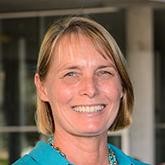April 20, 2017
Division of Biology Seminar April 21
Submitted by Division of Biology

Janet Franklin, Arizona State University, will present "California's Forests Navigate Complex Terrain in a Changing Climate" as part of the Division of Biology Seminar Series at 4 p.m. Friday, April 21, in 120 Ackert Hall.
The lecture will cover microclimates that describe the conditions experienced by individual plants and the heterogeneous microclimates found in mountainous terrain may allow tree species to persist in a changing climate, buffering species' exposure to regional climate change. Seedling establishment is a sensitive stage of tree regeneration that may govern species' local persistence and migration under environmental change. We found, using the results of a common garden experiment, that interannual variability in climate can provide windows of opportunity for tree seedling establishment that are overlooked when long-term climate averages are used to predict climate change effects on forest distributions.
Franklin also investigated the role of topoclimatic suitable sites of establishment in conjunction with disturbance and succession in mediating forest range shifts in California using a spatially explicit simulation model. Disturbance (fire) regimes were important in mediating species range changes during climate change, expediting range contractions for some species and facilitating range shift and expansion others. Topoclimatic suitable sites generally had a smaller effect on range changes than disturbance, enhancing persistence of some species, but hampering migration under some disturbance regimes for species with low dispersal capabilities. Effects of climate change on forest range changes will likely be modulated by complex trade-offs between landscape heterogeneity, disturbance regimes and species functional traits.
The study is part of a project integrating climate model downscaling, microclimate measurements, experimental studies of seedling recruitment, and spatially explicit plant population models to link micro-scale ecological processes to macro-scale forest dynamics under climate change. The study is funded by the National Science Foundation's MacroSystems Biology Program.
This seminar is funded by the Division of Biology and the Clean Air Warrior Excellence Fund. The fund was created in memory of attorney and K-State alumnus Robert Patrick, 1947-2015, to honor his proud career at the Environmental Protection Agency and specifically the work he did with the Clean Air Act. Patrick devoted his career to improving the environment and was fondly known by colleagues as the "Clean Air Warrior."
If you would like to visit with Franklin, please contact John Briggs at jbriggs1@k-state.edu.
